How German paratroopers stormed Crete
The plan for the 11 Corps operation was to carry out a simultaneous landing of an airborne assault force and a landing of gliders at several points on the island. The Germans did not have enough aircraft to land the entire landing at once, so it was decided to attack in three waves.
The first wave (7 o'clock in the morning 20 in May 1941, parachute and glider landing) included the group "West". Major General O. Meindel with a separate airborne assault regiment had to take Maleme airfield and approaches to it. This airfield was the main landing point of the German troops. The 3 th paratrooper regiment of Colonel Heydrich was to occupy the bay of the Court and the city of Chania (Kanya), where the English headquarters and the residence of the Greek king were.
In the second wave (13 hours 20 May) - parachute landing, included the group "Center" and "East". The 1th Parachute Regiment of Colonel B. Brower (later the army was to be headed by the commander of the mountain rifle division, General Ringel) was to take the city of Heraklion and its airfield. The 2 Parachute Regiment of Colonel Sturm was in charge of the Rethymnon airfield.
It was planned that after the capture of all targets from 16 hours on May 21, the third wave will begin - the landing from transport aircraft and ships of the 5th Mountain Rifle Division and heavy weapons, all the necessary supplies. Italy also supported the sea landing: about 3 thousand soldiers, 60 ships. From the air, the landing was supported by the 8th air corps of General von Richthofen - more than 700 aircraft, as well as 62 aircraft of the Italian Air Force. German-Italian aviation had to act against the garrison of the island and paralyze a powerful British naval group. The operation also involved German submarines and part of the Italian Navy (5 destroyers and 25 small ships).
For the British, a cover from the sea was carried out by the forces of the British Mediterranean fleet Admiral Cunningham - 5 battleships, 1 aircraft carrier, 12 cruisers and about 30 destroyers deployed west and north of Crete. True, the British fleet, based on the Bay of the Court, suffered greatly from attacks by enemy aircraft. And the only British aircraft carrier, during the battle for Greece, lost most of its carrier-based aircraft and could not support the garrison of Crete from the air.
The beginning of the invasion
Early in the morning, the German air force brought a massive blow to the British position at the landing sites. However, most of the camouflaged positions survived, and the British air defense did not open the return fire, so as not to give out their location. In addition, gliders and junkers with paratroopers approached only half an hour after the departure of the bombers and attack aircraft. The Germans did not take into account the weather, it was hot and the first batch of aircraft raised a cloud of dust. The rest of the aircraft had to wait. Launched the first aircraft circled in the sky, waiting for the rest. As a result, it was not possible to land on the move immediately after the bombing. There was a pause that had the most negative impact on the landing.
When in 7 hour. 25 min. The vanguard of Captain Altman (2-th company of the 1-th battalion of the assault regiment) began landing. Marines met a strong fire. Gliders turned into a sieve, fell apart in the air, crashed against rocks, fell into the sea, desperately maneuvering, sat down on roads, any suitable sites. But the landed German paratroopers violently attacked the enemy. The allies struck by their audacity were initially taken aback. But they quickly awoke and attacked mortar and machine-gun fire on the Germans. The seizure of the airfield failed on the move, the New Zealanders in hand-to-hand combat threw the Germans away. Altman managed to capture only the bridge and part of the positions west of the airfield. At the same time he has only 108 fighters left from 28 fighters.
The problem was that German paratroopers dropped without carbines and machine guns. Personal, heavy weapon and ammunition dumped in separate containers. And they still had to get to. The paratroopers had submachine guns (about one in four, pistols and hand grenades). As a result, many paratroopers died trying to break through to their containers. German paratroopers went on the attack with pistols, hand grenades and deminers, the allies shot them with rifles and machine guns, as in a dash.
The battalion, which followed the forward detachment, also ran into heavy fire. Many died still in the air, the commander of the battalion, Major Koch, and many soldiers were injured at the beginning of the battle. The company that landed on the 1 enemy battery seized it, but suffered heavy losses - 90 was left from the 30 soldiers. The 4 Company and the headquarters of the 1 Battalion fell to the positions of the New Zealand battalion and they were almost completely destroyed. 3-I company was able to get to the air defense battery south of the airfield and defeated it. This minimized the loss of German aircraft during the release of the main forces. In addition, with the help of anti-aircraft guns, they were able to take up defense and rejected the reinforcements rushing to the aid of the garrison of the airfield.
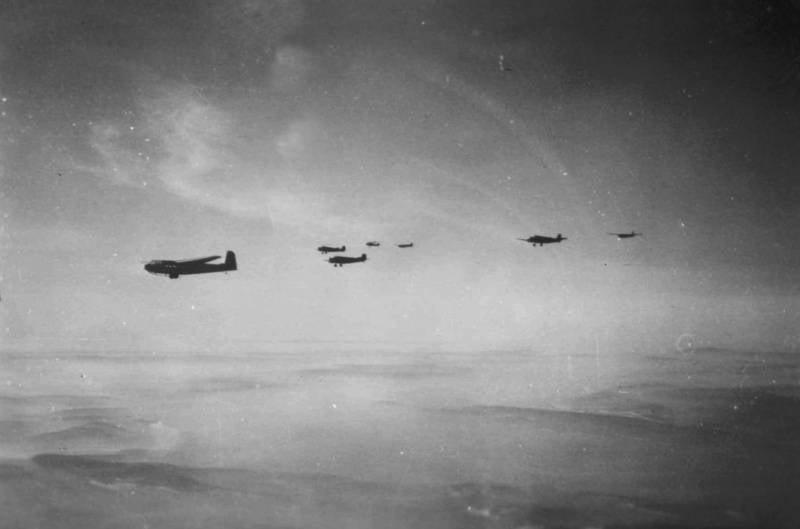
German transport aircraft Junkers Y. 52 towing gliders DFS 230 during the first day of the operation "Mercury"
Thus, the German paratroopers made such a dense fire that many German soldiers died or were injured before landing on the island. Many gliders crashed before landing. Others landed, but were immediately shot before the landing. Because of intelligence errors, often paratroopers were landed over the main lines of defense of the enemy and the Germans were simply shot from all trunks. And the remnants finished on the ground. Mostly landing was almost completely destroyed. It was a slaughter.
Thus, the paratroopers of the 3 Battalion landed northeast of Maleme directly at the position of the New Zealand 5 Brigade. The German battalion was almost destroyed. The 4 Battalion with the regimental headquarters successfully landed westward, having lost few people and was able to gain a foothold on one side of the airfield. True, the commander of the detachment Meindel was seriously wounded. He was replaced by the commander of the 2 Battalion, Major Stenzler. His battalion entered the battle east of Spilia and suffered heavy losses. Part of the paratroopers were interrupted by Cretan militias. A reinforced platoon of Lieutenant Kissamos landed among the Greek troops. Of the 72 soldiers, only 13 of surrendered paratroopers survived, who were rescued by New Zealand officers from reprisals. Hard battle lasted all day. Positions at the airport changed hands. The Germans were gradually able to unite the remaining forces, grouping around the 3 company and entrenched in the northern part of the airfield.
Similarly, events developed in the landing zone of the 3 regiment, dropped east of Maleme. Before the landing, the entire division headquarters and the commander of the 7 Air Division, General Süssmann, who was to lead the operation on the ground, died. The 3 th battalion, which was thrown out first, died, it fell into the position of the New Zealanders: many were knocked out even in the air, killed or captured after landing. By mistake, the pilots dropped several units over the mountains. The soldiers got broken and out of order. One company was blown into the sea by the wind and it sank; The 13-I mortar company was dropped over the reservoir and also sank in full force. Only the 9-I company landed safely and after a fierce battle, took all-round defense. The landing continued all day. The surviving German paratroopers were scattered and tried to unite, to break through to the containers with weapons.
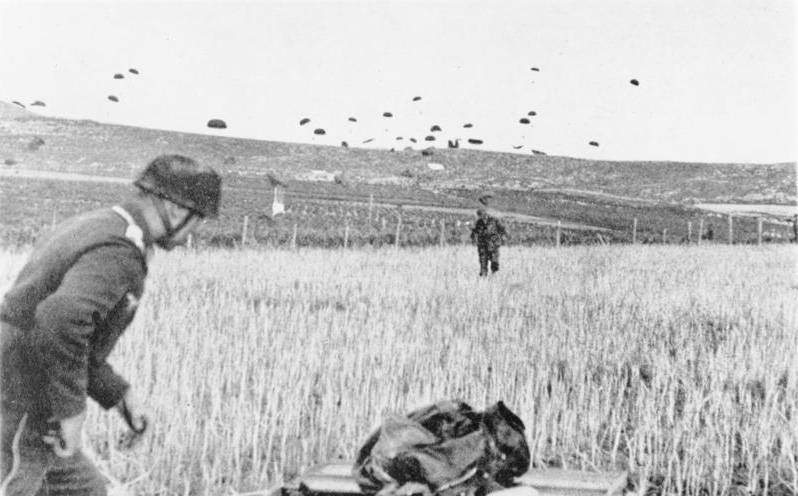
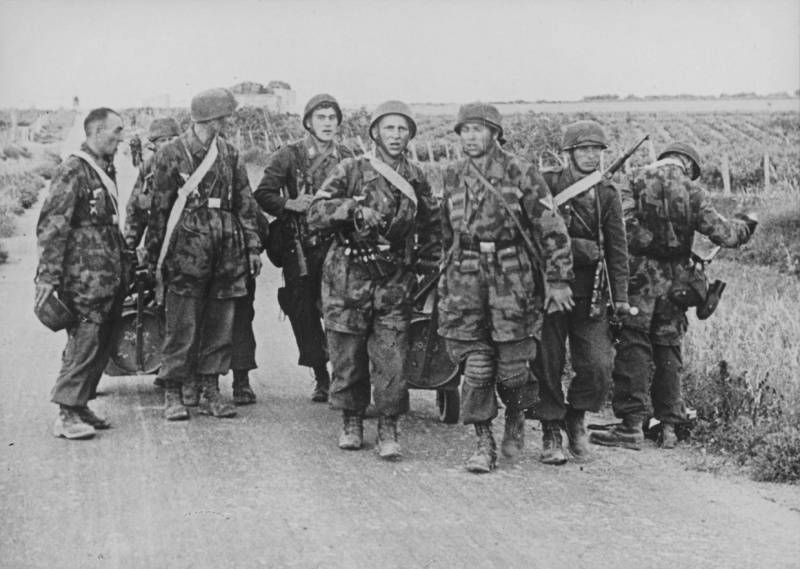
German paratroopers carry containers with equipment
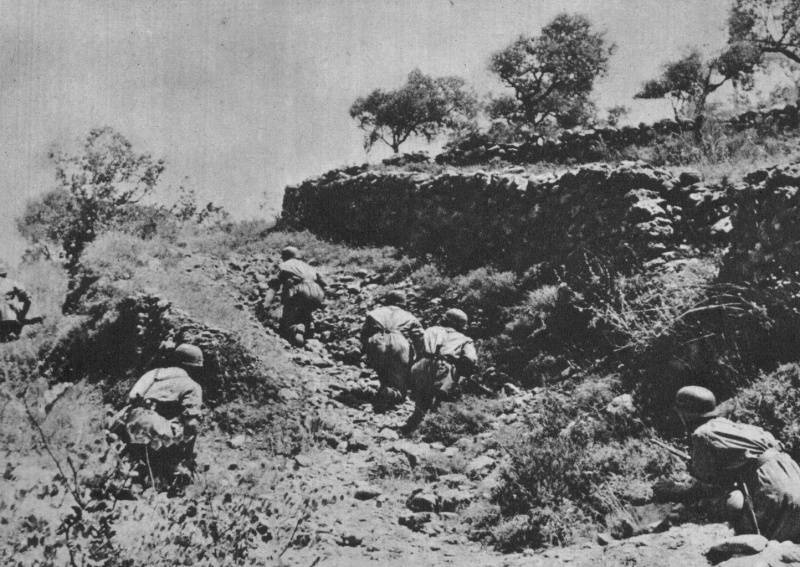
German paratroopers in battle in Crete
The second wave. At first, the German command had no data on the catastrophic situation of the landing force, having decided that the landing was successful. Of the 500 aircraft that threw out the 1 th invasion wave, only a few have not returned. The crews of the German aircraft, who were returning to the mainland to take the soldiers of the second wave, did not see what was happening on the island, and thought that things were going well. Therefore, the headquarters of Lør and Student gave the go-ahead to transfer the second wave. But things went even worse than in the morning. The planned change of bomber and transport squadrons again failed. Clouds of dust and problems with refueling slowed the movement of aviation. The aircraft departed in small groups and at large intervals. It was not possible to create a dense wave, the German troops landed without air support, small detachments and with large dispersion. And now they were waiting for even more "hot meeting." All more or less suitable sites were blocked and adjusted.
The 2 Airborne Regiment arrived at Rethymnon very late - at 16 hour. 15 min. Only two companies managed to land after an air raid, the third was blown away 7 km from the target. The landing of the main forces was delayed and they suffered heavy losses. The 19-I Australian Brigade quickly recovered and met the enemy with heavy fire. However, the 2 battalion fighters were able to capture one of the dominant heights and tried to make their way to the airfield. They were met by such strong fire from other heights and armored vehicles that were there that the Germans rolled away. Making sure that the airfield did not take the airfield, the paratroopers began to dig in and wait for reinforcements. Having gathered the soldiers scattered around the district at night, the paratroopers repeated the attack, but again came under heavy fire and retreated back, taking up defensive positions. Paratroopers suffered heavy losses, by the evening around 400 people were killed, and the detachment commander Colonel Sturm was captured.
The situation for the 1st regiment was even worse. He was thrown off with even greater delay, at 17 o’clock. 30 minutes. when the bombers had already left, and the British prepared for battle. In addition, part of the regiment had already been dropped on Maleme, the airfield of Heraklion was covered by reinforced air defense, and the paratroopers had to jump from high altitude. This has increased losses. Landing fell under heavy fire, including artillery and rooted to the ground Tanks. This led to a complete defeat. Two companies died almost entirely (5 people survived), the remaining units were dispersed, and only the onset of night saved them from complete extermination. After assessing the situation, Colonel Brower refused a suicide assault and focused on collecting survivors and finding containers with weapons. The Germans captured the former prison in the village of Agya and created a defense unit on the road to Chania.
Thus, the position of the German assault was disastrous. Many commanders died, were seriously injured or captured. Of the 10 ths. Landed paratroopers in the ranks, only about 6 thous. People remained. No goal has been achieved. Occupied positions held with difficulty. The Germans almost spent their ammunition, heavy weapons were not enough. Wounded, tired parachutists were preparing for the last battle. There was no connection (the radio was broken when disembarking), the pilots could not give a clear picture of the battle. As a result, the German command in Athens did not know that the landing was almost defeated. The Allies had complete superiority in forces and de facto could destroy the existing German forces. However, General Freiberg made a mistake. He saved forces, believing that the landing of the main forces of the enemy, who were waiting from the sea in the region of Chania and the Gulf of the Court, was ahead. The Allies missed a chance to win, not throwing all the reserves to eliminate the enemy in the area of Maleme.
It was not only the inaction of the allies that straightened the situation, but also the quality of the training of German officers. Even in the face of the deaths of many top commanders, the remaining officers independently created resistance nodes and literally bit into the many times superior forces of the enemy, imposing a battle on him and shackling his initiative. German paratroopers bravely fought, hoping that the comrades were more fortunate and were waiting for reinforcements. At night, they didn’t slow down, searched for their own, attacked the enemy, got weapons. The British missed the time, got confused in the situation. They also had problems: no one knew about the situation as a whole, there was not enough communication equipment, there was no transport for the transfer of troops, armored vehicles for the organization of counterstrikes, the superiority of the Germans in the air, the lack of support for their aircraft. Freiberg saved power, waited for the main enemy forces. Many Allied soldiers had poor training: they fought halfway, they were afraid to attack, they were not fully defensive. Thus, the Allies lost the initiative and did not use their large numerical advantage; they lacked combat experience, pressure and courage. In this situation, the German paratroopers kept out of their last strength, and survived until reinforcements arrived.
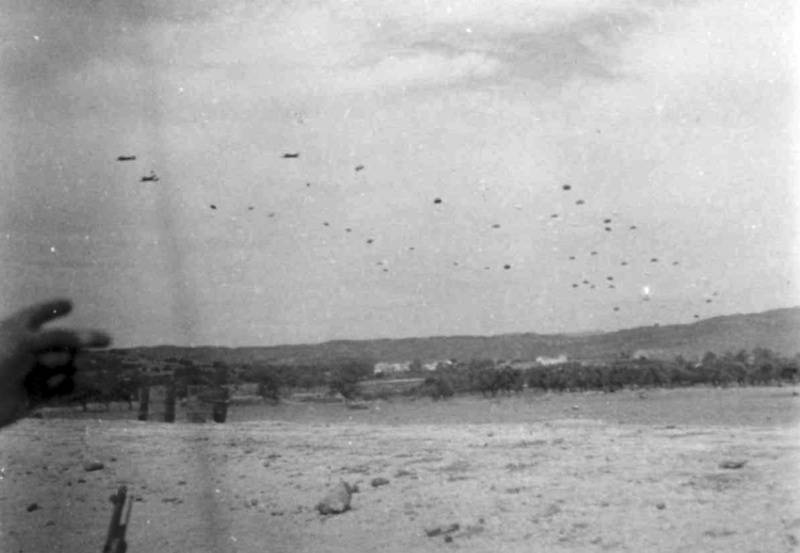
The second wave of German paratroopers parachuted in the area of the city of Rethymnon
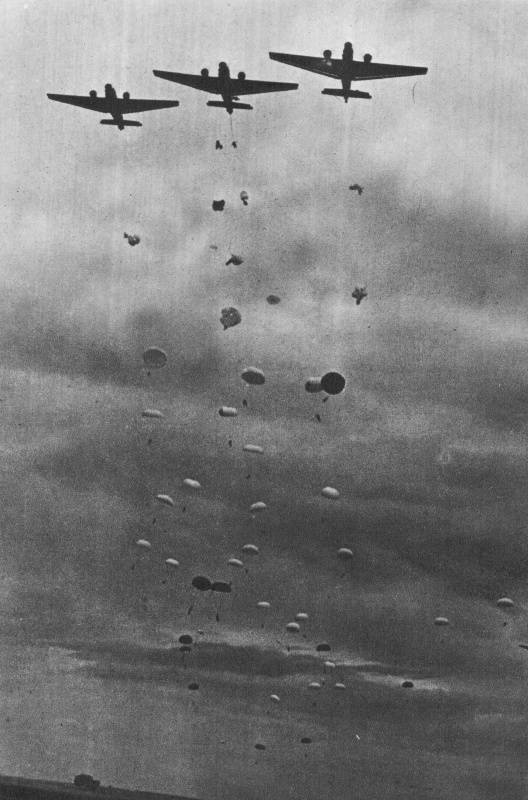
Landing German paratroopers and containers with weapons and ammunition
The continuation of the battle
On a special plane, General Student sent his liaison officer, Captain Klyaye, to Crete. After jumping with a parachute at night, he was able to correctly assess the situation and report back to headquarters. Realizing the threat of failure, the commander of the operation rejected the proposal to wind down the operation, and ordered 21 to throw all available forces at the storm of Maleme Airport. There were going to smuggle the third echelon of the invasion - mountain rangers. At night, all free transport planes in south-eastern Europe were mobilized and transferred to Greece.
With the dawn the battle resumed. With the support of aviation, German paratroopers captured part of the Maleme airfield. It was not possible to capture all the landing grounds. Aircraft with ammunition sat right on the beaches, suffering accidents. Successfully landed only one, he brought the wounded, including Meindel. The German command threw into battle the last reserves. In 14 hour. Two landing anti-tank companies were landed. In 15 hour. The 550 fighters of the second wave of the invasion, led by Colonel Ramke, entered the battle; they were unable to land on May 20 due to aircraft breakdowns. As a result, the Germans were able to take the airfield.
Meanwhile, the first attempt by the sea to land part of the rangers failed. The German command planned to transfer part of the mountain rifle division, heavy weapons and equipment by sea on small Greek ships, which were covered by an Italian destroyer. However, the British ships intercepted the landing flotilla north of Crete and sank most of the ships, destroying soldiers, weapons and supplies to 300. The remaining motorboats fled. 22 May, a new amphibious flotilla nearly repeated the fate of the previous one. This time the British navy were tied up by the British, and the German air force was so active that the British ships were forced to retreat. Here the first significant air-sea battle took place, and the aircraft showed that it is capable of defeating the fleet and forcing it to retreat. The British lost the 3 cruiser, the 6 destroyers, many ships suffered serious damage, including two battleships.
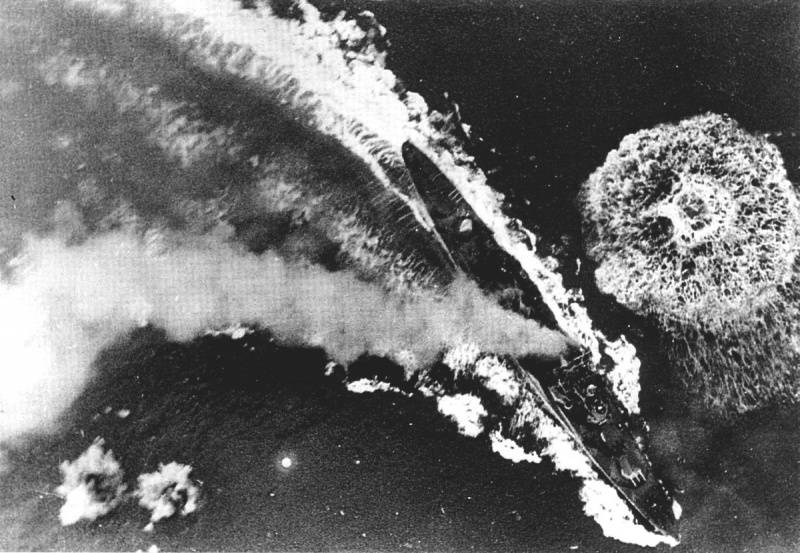
The British light cruiser "Gloucester" under the blow of German bombers. 22 May Luftwaffe dive bombers Junkers Ju.87R attacked the Gloucester cruiser and achieved four direct hits. As a result of a series of devastating explosions, the ship went to the bottom, taking with them 725 crew members
The British continued bombardment of the airfield with mortars and anti-aircraft guns from the dominant heights. The Germans fired back from captured guns. Transports with mountain rangers began to arrive in this hell. Not everyone was lucky, as the shelling continued. Some aircraft hit the air right, others - already on the ground, the third - were lucky. The landing pad (length of runway 600 meters) had to be cleared by the wreckage of the aircraft with the help of captured armored vehicles. Then everything was repeated. In two days, the Germans lost more than 150 machines. It was a nightmare, but at a great price German paratroopers and huntsmen punched a gap in the defense of the enemy. Step by step, the Germans crowded the enemy, seized new positions. The most stubborn firing points suppressed with the help of aviation. In 17 hour. Maleme village was captured. The gates to Crete were occupied, which allowed us to gradually increase the forces of the landing force on the island. The operation was headed by the commander of mountain rangers, General Ringel.
Freiber realized his mistake and ordered the New Zealanders to repel the airport. At night, the Allies nearly beat off the airfield. They were stopped at the edge of the airfield. In the morning, German aircraft drove off the enemy. In other areas, the German paratroopers tied the enemy by combat. In Rethymnon, the remnants of the 2 th paratrooper regiment stayed for a day at a busy height, and then retreated to the ruins of the plant, where they held, fettering up to 7 thousands of enemy soldiers. The 1 Parachute Regiment attempted to take Heraklion, but the attack choked. Colonel Brower was ordered to stop and hold down the enemy by combat. German aviation initially failed to effectively support the paratroopers, and they had to repel the 8 attacks of thousands of British themselves.
22 May in Maleme paratroopers captured the prevailing height of 107. On the same day, the Luftwaffe dodavilo remnants of enemy artillery in the vicinity of the airfield, the shelling stopped. The air bridge earned its full potential: 20 vehicles with soldiers, weapons and ammunition arrived every hour. Return flights exported the wounded. General Student arrived with headquarters.
On May 23, the British tried unsuccessfully to repel an airfield, and then began to depart to the east. In Rethymnon, the paratroopers were able to repel enemy attacks with the support of aviation. In Heraklion, the Germans were able to unite the two groups. On the same day, the British fleet, suffering serious losses from the strikes of German aircraft, mostly went to Alexandria. Admiral Cunningham began at night to avoid attacks by the Luftwaffe, sending fleet of ammunition and food to the island. This allowed the German command to land a naval landing of several thousand Italian and German soldiers.
General Lör ordered the rangers of Ringel to seize the Bay of the Court and violate the supply line of the British garrison, as well as unblock the surrounded paratroopers in the area of Rethymnon and Heraklion. May 24-25 German troops attacked, breaking through enemy positions from Maleme to Chania. Only with the strong support of aviation did German troops break through the British defense and get through to Chania. Part of the Greco-British garrison was demoralized, and the mass desertion of the Allied soldiers began. In Rethymnon, the German paratroopers continued to fight in the environment, delaying the forces of the enemy. On the night of the 26, the remnants of the squad (250 soldiers) attempted to break into Heraklion. But having received the order, they stopped and received help, continued the fight. In Heraklion, having received reinforcements, the Germans launched a counteroffensive. 27 May the Germans went to storm Heraklion and occupied it without a fight. The British left the city and the airfield and began evacuating from the island.
Freiberg told the commander-in-chief of the British forces in the Middle East, Wavewell, that his troops were at the limit of their strength and capabilities and could no longer resist. 27 May Wavell and Churchill gave permission to withdraw troops. Freiberg began to withdraw troops to the south, towards Hrr-Sfakion, on the southern coast, from where they began to evacuate. The British fleet took out about 13 thousand people. for four nights. Part of the British and Greek troops were evacuated from Heraklion.
On May 28, the Germans broke down the stubborn resistance of the English rearguard east of Chania and occupied the bay of Souda, and hydroplanes immediately began to arrive there. In Rethymnon 29 in May, the German paratroopers continued the battle with the enemy forces that were many times superior to them. They were able to break through to the airfield and then came across the rangers who landed there. Help arrived at the last moment. Mountain hunters took the city. In this area, an Australian battalion was surrounded and captured, which did not receive an evacuation order. Ringel directed the main forces to the eastern part of the island, to the south, where the main forces of Freiberg moved, sent insignificant units.
The British evacuated through the southern part of the island and announced its surrender. The British fleet evacuated 15-16 thousand people, having lost several ships. June 1 operation was completed, the allied pockets of resistance were suppressed. The Allies made no attempt to recapture the island, and it remained in the hands of the Germans until the end of the war.
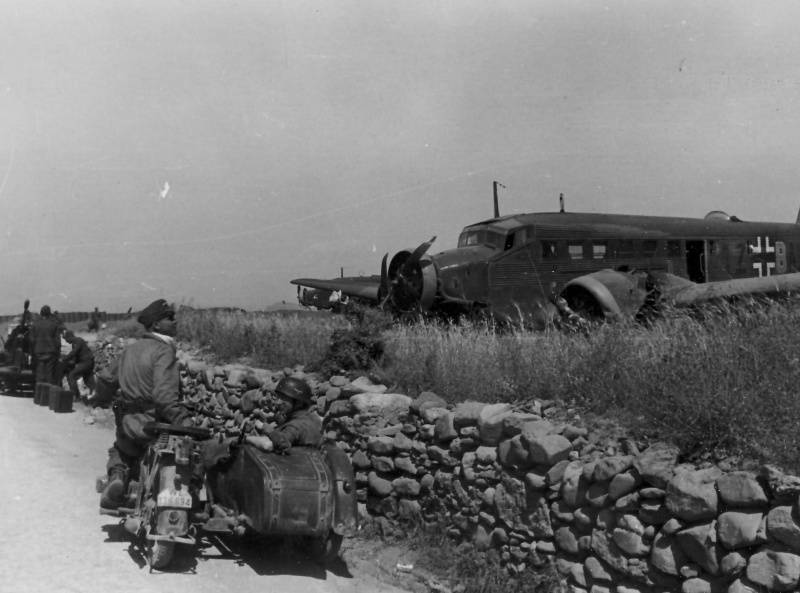
German paratroopers at the defeated Junkers U-52 at Maleme airfield
Results
German troops took Crete, the allies were defeated and fled. The Germans lost more than 6 thousand killed and wounded (according to other sources, about 7-8 thousand people), 271 aircraft, 148 aircraft were damaged (mainly - transport workers). Allied casualties: about 4 thousand killed, more than 2,7 thousand wounded and more 17 thousand prisoners. The British fleet lost (from aviation operations): 3 cruisers, 6 destroyers, more 20 auxiliary ships and transports. Also damaged: 1 aircraft carrier, 3 battleship, 6 cruisers and 7 destroyers. At the same time about 2 thousand people died. Allied forces lost 47 aircraft. Many Cretans died while participating in partisan activities.
Militarily, the airborne operation showed the importance of reconnaissance. German paratroopers suffered heavy losses due to underestimation of the enemy defenses. The Germans were not able to conduct a full-fledged air and artillery training, prepare bridgeheads. There was no effect of surprise, as the troops were waiting. Poorly armed paratroopers had to storm the relatively well-prepared positions of the enemy. They were saved by the relative poor preparation of the enemy, the lack of transport and heavy weapons from the allies. Played their role mistakes of the allied command.
The Germans have strategically strengthened their positions in the Balkans. But in order to build on success, and to consolidate positions in the Mediterranean, North Africa and the Middle East, it was necessary to continue the seizures - the Bosphorus and the Dardanelles, Malta, Cyprus, Gibraltar, Alexandria and Suez. By itself, Crete was only a springboard for a further offensive in the Mediterranean. As Churchill noted: “Hitler’s hand could have reached further, in the direction of India.” However, Hitler turned to the East and the capture of Crete did not affect the course of further hostilities in the region. The British maintained their position in the Mediterranean. The allies, struck by the effectiveness of the Goering Green Devils, began to accelerate the creation of their airborne forces.
The Fuhrer did the opposite; he was very upset by the high losses of the elite troops of the Third Reich. He rewarded Student and Riegel, but declared that “the time of the paratroopers has passed.” The student offered to take Suez for the next throw, but Hitler refused. All attempts to dissuade him were unsuccessful. The assault of Malta was also rejected (Operation Hercules), although Italy offered to single out large forces (the airborne and air assault divisions), since the seizure of this island was of paramount importance for controlling the central Mediterranean. The Fuhrer categorically banned major airborne operations. Now Gering's Airborne Forces ceased to be the army's edge, they were used only as “fire brigades”, plugging the most dangerous holes at the front.
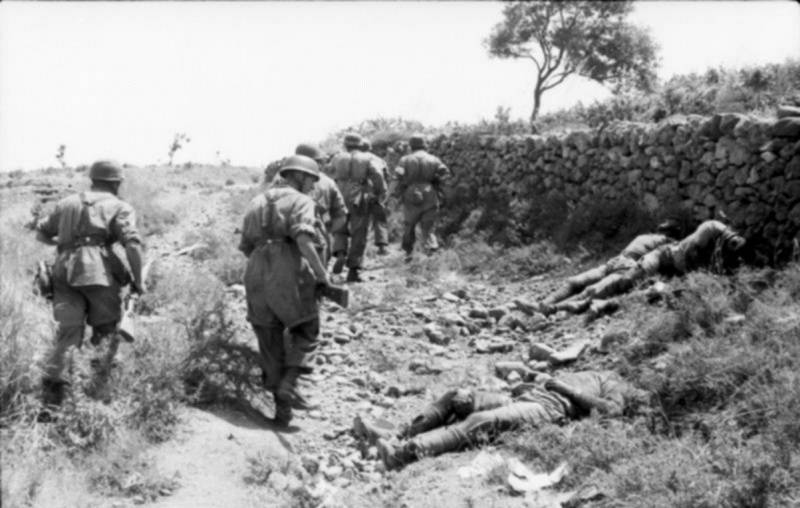
German paratroopers pass by British soldiers killed in Crete
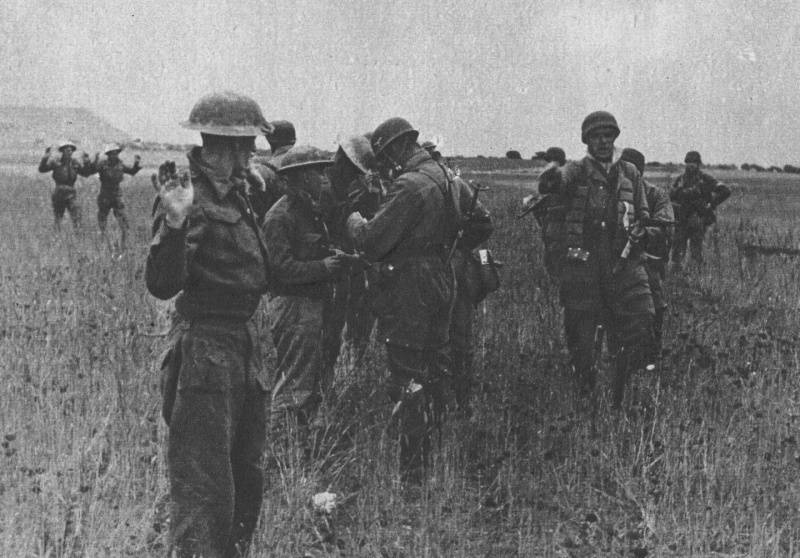
German paratroopers search the captured British soldiers in Crete
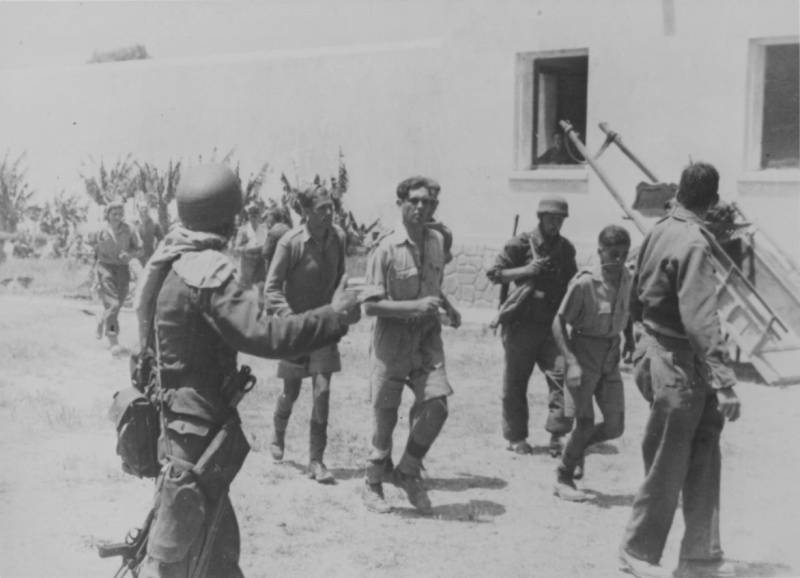
German paratroopers escort British prisoners along a city street in Crete.
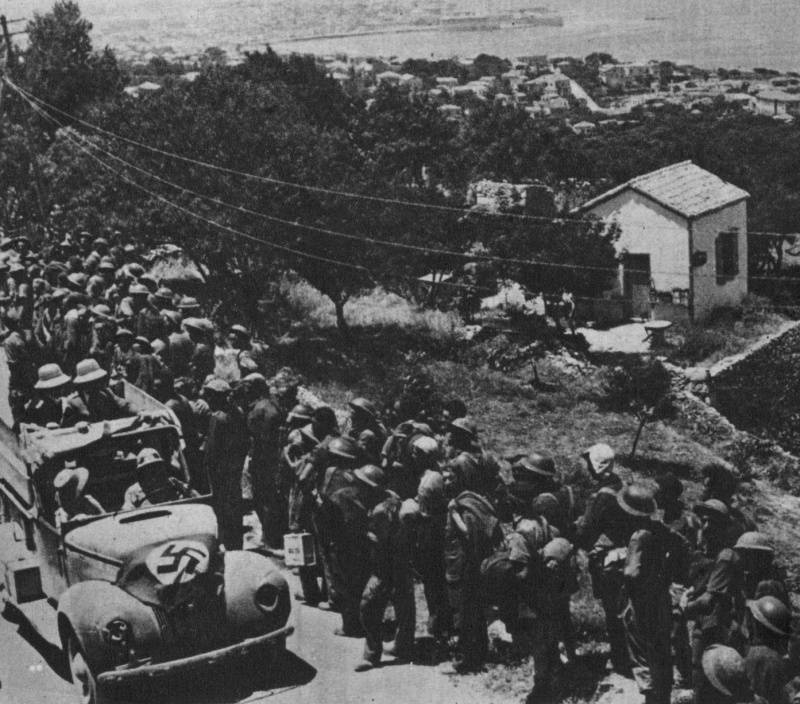
German truck drives past a column of British prisoners of war
- Alexander Samsonov
- 1941 Campaign
How defeated Yugoslavia and Greece
Yugoslav operation
Greek operation
Operation Mercury
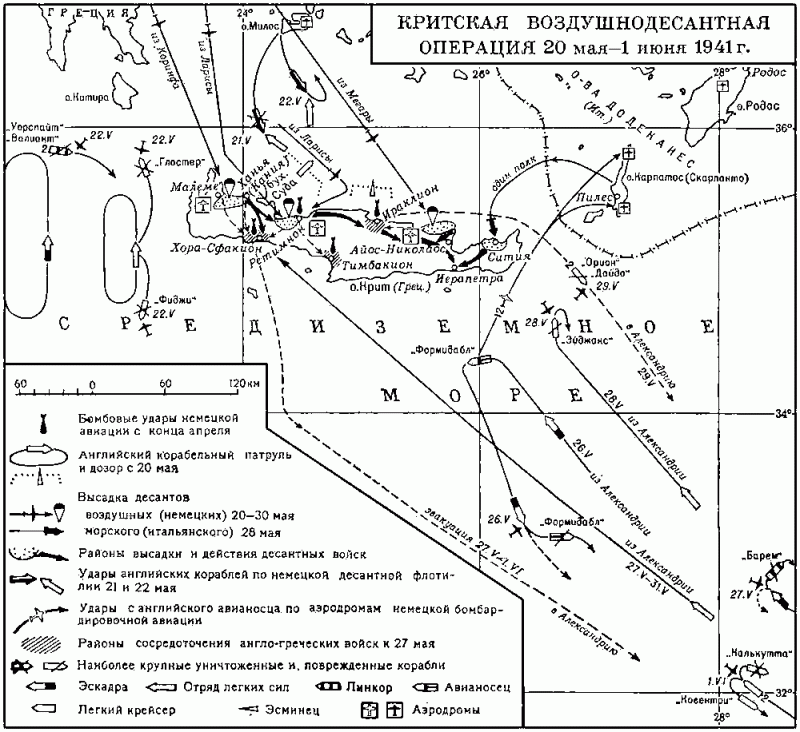
Information